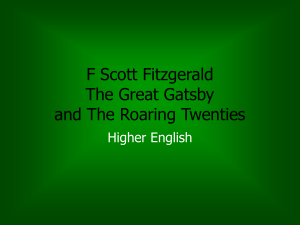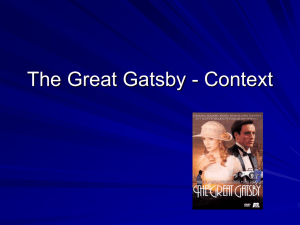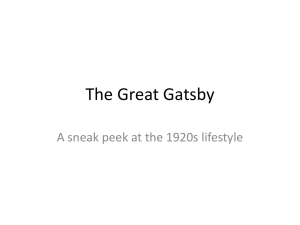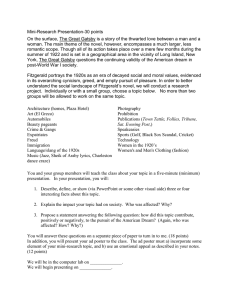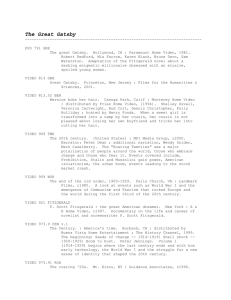An economy stimulated by WWI fueled a massive economic boom
advertisement
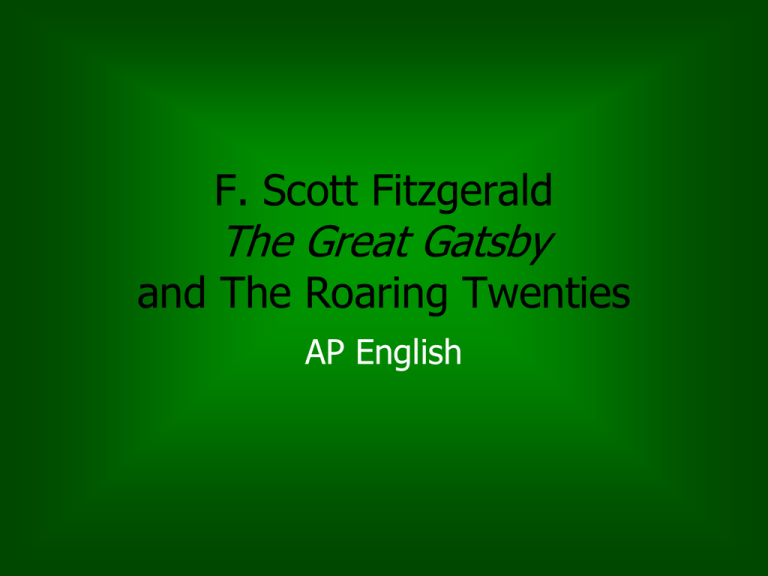
F. Scott Fitzgerald The Great Gatsby and The Roaring Twenties AP English 1920-1929: Changing Times The 1920s were a time of unprecedented social and technological change in so many areas: Literature Music Media / Technology Women’s Rights Prohibition Lifestyles An economy stimulated by WWI fueled a massive economic boom. General Business Conditions • • • • Stable prices High employment Economic Boom Prime interest rate averaged less than 5% • Stock yield higher than bond yields Income Distribution • Equalizing effect of income tax during the war but • 1922: Top 1% held 32% of nation’s wealth • 1929: Top 1% held 38% of nation’s wealth • “The rich get rich and the poor get… children” The Roaring Twenties The decade of the twenties is often referred to as the “ Jazz Age’. However, the term has much as much to do with the jazzy atmosphere of the time as with the music! Jazzy Sounds • Prohibition brought many jazz musicians north from New Orleans to Chicago and New York • Joe “King” Oliver was one of the best • Jazz became the soundtrack of rebellion for a younger generation Music in Gatsby • You will read about the “yellow cocktail music” of Gatsby’s parties. • This was Jazz and Ragtime – Louis Armstrong, – Duke Ellington King Oliver Jazzy Duds • Flappers were typical young girls of the twenties, usually with bobbed hair, short skirts, rolled stockings, and powdered knees! • They danced the night away doing the Charleston and the Black Bottom. Jazzy Talk -Twenties Slang • • • • • • • • • • All Wet - wrong Bee’s Knees - a superb person Big Cheese -an important person Bump Off - to murder Dumb Dora - a stupid girl Flat Tire - a dull, boring person Gam - a girls leg Hooch - bootleg liquor Hoofer - chorus girl Torpedo - a hired gunman Gee I wish a torpedo would bump off this flat tire Dumb Dora Lifestyles and fashions of the 1920s • • • • • • • • No more Victorian Values Flappers Collegiate Students Independent women Gaiety Increasing wealth Social mobility Alcohol consumption Women’s Rights Movement • Suffrage - the right to vote • Nineteenth Amendment (1920) • Changing attitudes and fashions help bring about the new woman (Jordan Baker) • The “Flap” Over Flappers: http://www1.assumption.edu/u sers/McClymer/his394/Flapo verFlappers.html The playful flapper here we see, The fairest of the fair. She’s not what Grandma used to be,-You might say, au contraire. Her girlish ways may make a stir, Her manners cause a scene But there is no more harm in her Than in a submarine. She nightly knocks for many a goal The usual dancing men. Her speed is great, but her control Is something else again The Flapper by Dorothy Parker All spotlights focus on her pranks. All tongues her prowess herald For which she well may render thanks To God and Scott Fitzgerald. Her golden rule is plain enough-Just get them young and treat them rough Cole Porter – “Anything Goes” Times have changed And we've often rewound the clock Since the Puritans got a shock When they landed on Plymouth Rock. If today any shock they should try to stem 'Stead of landing on Plymouth Rock, Plymouth Rock would land on them. In olden days, a glimpse of stocking Was looked on as something shocking. But now, God knows, Anything goes. Good authors too who once knew better words Now only use four-letter words Writing prose. Anything goes. If driving fast cars you like, If low bars you like, If old hymns you like, If bare limbs you like, If Mae West you like, Or me undressed you like, Why, nobody will oppose. When ev'ry night the set that's smart is inTruding in nudist parties in studios. Anything goes. Visual Portraits Anything Goes: http://www.youtube.com/watch?v=qo6lPifGnGA Thoroughly Modern Millie: http://www.youtube.com/watch?v=C53j2eipfvM &feature=related The Artist: http://www.youtube.com/watch?v=OK7pfLlsUQ M Prohibition • The Volstead Act • 18th Amendment (1919) 21st Amendment Repealed (1933) • Bootleggers – Sold, bought, consumed alcohol. – Gangsters Al Capone and a ‘gonnection’ Media and Technology • Automobilisation – the car is available to many • from courting to dating • Mass Media – Magazines and literacy • Reader’s Digest • Time – Radios and advertising – New forms of narrative • Movie - “talkies” e.g. The Jazz Singer • Popular Sports F Scott Fitzgerald • 1896-1940 • Descendent from “prominent” American stock and born into an upper-middle class Irish family • Attended Princeton but left without graduating • Missed WWI (just) • Met Zelda but couldn’t afford to marry her while he was training at Camp Sheridan in Montgomery, AL • Published This Side of Paradise in 1920 at the age of 24: instant stardom • This increased his wealth, and Zelda, his “golden girl,” decided to accept his hand in marriage after all. • Wrote “money-making” popular fiction for most of his life, mainly for the New York Post: $4000 a story Fitzgerald Continued • He and Zelda had a daughter, Frances “Scottie” • Wrote what is considered his masterpiece, The Great Gatsby, in France in 1924-25 • Zelda had an affair, and Gatsby was poorly received • Attempts to earn a clean literary reputation were disrupted by his reputation as a drunk • Zelda became mentally unstable • Scott had an affair with gossip columnist Shielah Graham • Moved to Hollywood as a screen writer • Died almost forgotten aged 45 • Zelda perished in a mental hospital fire in 1948 Literature of the 1920s • Authors wrote about their personal lives as something “knowable”. • Gatsby contains a great deal of autobiographical material and references to the 1920s. • Fitzgerald was also influenced by Modernist theories about art. Modernism in the Twenties The Modernist Era • Rejection of Romanticism and the advent of moral uncertainty – the catastrophe of World War I – (the wasteland and valley of ashes) • Embracing the new, i.e. mechanization and industrialization – (Gatsby’s car) – new (replaceable) fashions – mass entertainment • Using new means of Representation – the development of cinema – the mass media and advertising Literary Periods in American Literature • Pre-settlement period (prior to 1620s) • Puritanism (1620s-1783) • Enlightenment/Colonialism (second half of 18th century) • Romanticism/Transcendentalism (1820s1861) • Realism (1860s-1890s) • Naturalism (1890s-1950s) • Modernism (1914-1945) • Post WWII (1945-) Modernism and Nick Carraway • Because of the chaos there was a longing for order. • The modernist generation produced utopian ideologies such as communism, fascism, and futurism. • Look at Nick in his retreat from the modern word. • “I wanted the world to be in uniform and to stand to a sort of moral attention forever” Modernism and Romanticism Nick Gatsby Fitzgerald and Modernism • Modernists mistrusted the possibility of absolute truth and idealism. • Consider the multiple and limited points-of-view employed in Gatsby. What effect does this have on the concept of absolute truth? • How does Nick force us to view the “reality” that he portrays? • In modernist literature “loose ends” were embraced rather resolved clearly. What does this suggest about the truth? Is The Great Gatsby a period piece, or does the novel step outside its time and address universal themes?

